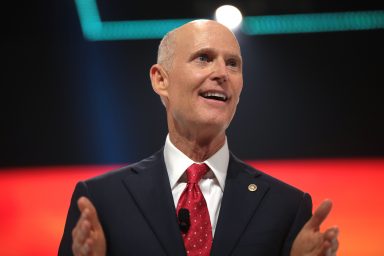How many lawyers does it take to make the antiparasitic work for COVID-19?
|
Listen To This Story
|
In March, the Food and Drug Administration (FDA) settled a lawsuit over its years-old public messaging discouraging the use of the antiparasitic drug ivermectin — an important medicine in global health which is also commonly prescribed by veterinarians in the US — as a treatment for COVID-19. As part of the settlement, the agency agreed to delete its famous “you are not a horse” posts from social media.
The lawsuit was initially filed back in 2022 by three doctors, who argued the FDA’s messaging advising against the use of ivermectin for COVID-19 “illegally interfered with the practice of medicine” and claimed to have suffered professional consequences as a result of the FDA’s statements. While the case was dismissed in December 2022, it was controversially revived in September 2023 by the conservative Fifth Circuit Court of Appeals.
Numerous high quality studies have shown ivermectin is not effective as a treatment for COVID-19 and, the settlement notwithstanding, the FDA has not changed its tune on the drug itself. In an email to CNN, the agency explained that it had “chosen to resolve this lawsuit rather than continuing to litigate over statements that are between two and nearly four years old.” It added:
FDA has not changed its position that currently available clinical trial data do not demonstrate that ivermectin is effective against COVID-19. The agency has not authorized or approved ivermectin for use in preventing or treating COVID-19.
Their statement and position couldn’t be much clearer. Nevertheless, ivermectin promoters and their allies took a victory lap online, with outlets like the embattled Epoch Times (whose CFO is now under federal indictment for money-laundering), the right-wing Brownstone Institute, and The Defender, the blog of presidential candidate Robert F. Kennedy Jr.’s Children’s Health Defense, joining in on the celebration.
Plaintiff Dr. Mary Talley Bowden — who formed a super PAC to sponsor political candidates vowing to ban the life-saving mRNA COVID-19 vaccines and was recently named a senior fellow at the ivermectin-promoting Frontline COVID-19 Critical Care Alliance (FLCCC) — took to Twitter/X to claim that the FDA “los[t] its war” on the drug. The outcome, she wrote, “sets an important precedent in limiting FDA overreach into the doctor-patient relationship.”
Ivermectin is not an exceptional case. The FDA is biased against many low-cost, generic, and/or natural therapies with low profit potential. Could it be because half its funding comes from Big Pharma? https://t.co/LxpqLuvb6A
— Robert F. Kennedy Jr (@RobertKennedyJr) March 22, 2024
Bowden’s celebratory tweet was amplified by Kennedy, who has promoted ivermectin and another failed COVID-19 treatment pushed by the Right, hydroxychloroquine. Kennedy shared Bowden’s post, adding, “The FDA is biased against many low-cost, generic, and/or natural therapies with low profit potential.”
This commentary from Kennedy came on the heels of a Washington Post analysis of the tax records of Children’s Health Defense and FLCCC, revealing the millions they’d amassed throughout the pandemic while spreading inaccurate information about the virus, its treatments, and vaccines.
Bowden has also been embraced by Kennedy’s running mate, Nicole Shanahan, who recently hosted the doctor on her podcast, characterizing her as “defamed by the ‘experts’ and censored by the media.”
She was defamed by the “experts” and censored by the media for daring to speak out about the benefits of ivermectin for treating Covid patients. But she never backed down. Today, @MdBreathe shares her story. pic.twitter.com/OZc2KxNESo
— Nicole Shanahan (@NicoleShanahan) May 31, 2024
This FDA case was not the first time Bowden lawyered up during the pandemic. She previously filed a $25 million defamation lawsuit against Houston Methodist Hospital, which suspended her privileges amid her pro-ivermectin, anti-vaccine crusade. Her suit was dismissed last year and she lost her appeal last month after failing to prove the hospital’s statements describing her as promoting misinformation were false.
Bowden has also been engaged in a battle with the Texas Medical Board, which has received numerous complaints about her throughout the pandemic. She had a hearing before her state board scheduled for the end of April. However, shortly before her hearing she shared on Twitter/X that it had been postponed to the fall, claiming issues had arisen with clearing the expert she had planned to speak in her defense.
In March, a damning updated complaint — including “standard of care violations,” “disciplinary action by a peer group,” and “unprofessional conduct” — was filed against her by the state board. It alleges that Bowden prescribed ivermectin for a hospitalized COVID-19 patient where she did not have privileges, and attempted to have the medication snuck in for the patient via a nurse — without reviewing the patient’s record or consulting with the treating physicians.
The FDA worked hard to control the narrative because the agency wanted the mRNA platform to become established as the standard, and there were “trillions of dollars at stake,” says Dr. Paul Marik. https://t.co/2Ku6DTA7Jq
— Children’s Health Defense (@ChildrensHD) April 1, 2024
In a post-FDA settlement interview with The Defender, Bowden’s co-plaintiff on the original lawsuit and a co-founder of the FLCCC, Dr. Paul Marik, explained that they filed the FDA suit on account of the agency’s “false posts, and their false accusations or false pretenses that they made about ivermectin.”
Like Bowden, Marik has taken legal action against a former employer during the pandemic. He sued his former hospital system, Sentara Healthcare in Virginia, for banning ivermectin for COVID-19 in 2021. Marik curiously filed the suit the same day his COVID-19 protocol paper was retracted owing to his hospital informing the publishing journal that he had underrepresented the mortality rate in the treatment group by 78 percent. He voluntarily withdrew the lawsuit in 2022.
Marik has had multiple publications retracted dating back to 1997, per the Retraction Watch database. He was alerted by the American Board of Internal Medicine last summer — along with his FLCCC co-founder, Dr. Pierre Kory — that he was to be stripped of his board certifications over his spread of COVID-19 misinformation.
Kory, who testified to the Senate about ivermectin in 2020, is a plaintiff in a lawsuit with Kennedy filed in January against the California Medical Board over their attempts to discipline physicians who have spread COVID-19 misinformation. While not a plaintiff on the FDA lawsuit, Kory claimed on Twitter/X that the settlement “proved the FDA’s attempts to cut off the public’s access to ivermectin during COVID were illegal” — an assertion in no way supported by the text of the settlement, which is brief and can be read here.
Today we achieved a monumental victory against the FDA in a court of law and proved the the FDA's attempts to cut off the public's access to ivermectin during COVID were illegal.
Here I explain the case and why we must never let the FDA do this again.https://t.co/rQK6NctPU5
— Pierre Kory, MD MPA (@PierreKory) March 23, 2024
It is worth noting that back in 2022, the FLCCC received a stern letter from the Division of Social Justice, Health Care Bureau in the office of New York Attorney General Letitia James, reprimanding the group for failure to “categorically reject the use of veterinary formulations of ivermectin” while there was a “fivefold increase in calls to the Poison Control Centers, most of which involved patients consuming large amounts of veterinary forms of ivermectin.”
According to the letter, this spike in calls is something the FLCCC acknowledged in their correspondence with the Health Care Bureau chief. On the FLCCC’s blog, their lawyer accused James’s office of “overreach.”
Given the issue of these poisonings, the “you are not a horse” messaging from the FDA was not wholly unwarranted and was likely effective in preventing more poisonings. Its snarkiness (to some) put it squarely in a long tradition of attention-grabbing public health and public service messaging (e.g., “Click It or Ticket”).
While the FDA’s desire to shake the lawsuit is understandable, capitulating to the litigious ivermectin doctors was arguably an unwise move. Dorit Reiss, a professor at UC Law San Francisco who writes about vaccine policy, called the decision to not appeal “the Fifth Circuit’s flawed and bad decision” to reopen the case a “mistake.”
https://twitter.com/VigilantFox/status/1762272672174494138
The spin put on the settlement announcement was completely predictable. The pro-ivermectin camp falsely claimed the FDA had admitted physicians could prescribe ivermectin for COVID-19 because of comments made in the appellate court last year. In reality, a representative for the FDA had simply stated that the agency does not have the authority to stop off-label prescription of any drug, including ivermectin.
The doctors in the FDA lawsuit didn’t “win” much of substance or pragmatic value with this settlement. What they did do was to show that with enough money and legal persistence they can get a federal agency to delete messaging they don’t like, setting a worrisome precedent.
Bowden, Marik, and Kory were all speakers at Children’s Health Defense’s “Rally to Reclaim Free Speech” outside the Supreme Court during the oral arguments for online misinformation case Murthy v. Missouri (formerly Missouri v. Biden) in mid March. Despite the organizing outside, The Washington Post reported that the Supreme Court, whose decision is now imminent, is “likely to reject” calls for limitations on government contact with tech companies regarding misinformation on their social platforms.
The Murthy case is far more important than the lawsuit against the FDA and this poor performance by the anti-content-moderation camp before the highest court is part of the reason disinformation researchers “feel a shift” in momentum after years of rampant online dis- and misinformation — including that ivermectin works for COVID-19.




